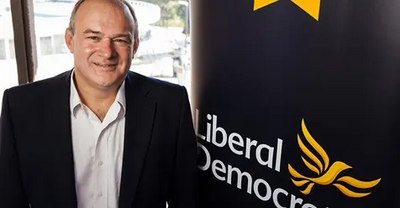This is Boris Johnson’s biggest foreign policy test yet – and succeeding means directly standing up to Trump

In the face of the bully-boy president, the prime minister's Brexit experiment must not override open and honest cooperation with our European allies
This week, we witnessed the appalling tragedy of the gunning down of 176 civilian air passengers, who were killed in what seems to have been an accident, but which was undeniably the fault of an unforgivably incompetent Iranian regime.
As this directly followed the crisis created by Donald Trump's decision to assassinate a leading Iranian general, tensions in the region remain alarmingly high.
So it's fitting that MPs will tomorrow (13 January 2020) debate Britain's role in the world - from Iran to Trump's America and beyond - and Britain's future foreign policy as we, regrettably, leave the European Union.
We all know there's an elephant in the room when it comes to Boris Johnson's foreign policy: a Republican elephant.
Looking towards the US presidential election later this year, Trump is doing what so many US presidents have done before him: attempting to show US power abroad, even if that means stoking tensions, in order to persuade US voters he is a "strong man".
Ever since the release of historian Arthur M Schlesinger Jr's famous book The Imperial Presidency, many Americans have shared concerns of people around the world, that, unchecked, the White House is not always a force for good.
But while Trump's behaviour fits into a pattern, no US president before has demonstrated such recklessness, with an unwillingness to consult and listen, whether it's to voices across Washington or voices in friendly capitals across the world like London. A big foreign policy challenge for 2020, is to ensure president Trump exercises his imperial powers more like a Constantine than a Nero.
Enter stage left, Johnson. We need our British prime minister to combine strength of character with a willingness to play the true friend to Trump. To act as a friendly check on an imperial president, facing impeachment and the electorate in the same year.
Has the prime minister got what it takes? The evidence is not encouraging. His reputation as an incompetent foreign secretary devoid of diplomatic prowess went way beyond his shocking mishandling of the case of Nazanin Zaghari-Ratcliffe and the Iranians.
Moreover, Johnson's primary motivation right now is to secure a US-UK trade deal that would vindicate his Brexit experiment, regardless of the damage it will do to our family of nations. In this respect, Johnson's personal abilities and political interests do not appear to align with the British national interest: he is unlikely to be tough enough with Trump.
The White House knows that Johnson is desperate for a deal. In his statement after the Iranians attacked US military bases in Iraq, Trump pointedly said the United Kingdom must abandon the Iran Nuclear Treaty - a treaty signed not just by Britain, our close European allies, China and Russia, but also by the last US president, Obama. Trump's statement was nothing short of a veiled threat: if the United Kingdom maintains its own foreign policy separate to the US, we can expect to be punished with a less good trade deal.
Johnson's own threats to rip Britain out of the EU, regardless of whether there's a deal for a future trading relationship, make us even more vulnerable to the whims of a president who bases decisions on his emotion and his ego, rather than calm reason.
In the face of bully-boy Trump, the Conservatives' Brexit experiment must not override open and honest cooperation with our European allies. Working with them, Britain should be a bulwark against this president's risk-taking and warmongering. We have to form part of a global Senate check to this particular imperial president.
Where we can find common ground with Trump, we must strengthen that cooperation. However much we disagree on his inconsistent and volatile approach to foreign policy - and especially his approach to climate change - the UK-US and EU-US relationships are vital.
But equally, we must stand firm and call for different policies, when Trump's actions unnecessarily increase global tension. We can, for example, demonstrate that by working constructively to engage with some brutal regimes like Iran, progress can be made. Equally, we can show that when we collectively impose effective sanctions on rogue states, that can also incentivise their leaders to act more responsibly.
The Liberal Democrats stood against the Iraq war and my party will oppose the escalation of conflict in Iran. We know from Iraq that the only people who would profit from a war with Iran would be arms dealers. For others affected, war means lives cut short, human suffering on a terrible scale and the flight of thousands - if not millions - of people from their homes into lives of enormous vulnerability.
That is why the Liberal Democrats will challenge this Conservative government to uphold the rules-based international system. Diplomacy is essential if we are to find peaceful resolutions in times of tension. Organisations like the UN - for all their faults - still represent the best path to achieving peace and security across the world, by promoting dialogue and allowing nations to work collectively to achieve particular ends. Britain must be the champion of international law.
Ed Davey is acting leader for the Liberal Democrats
